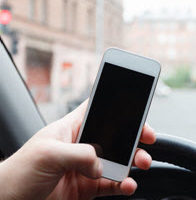Your Cellphone & The Police: What You Need to Know

Statistics suggest that nearly 95 percent of Americans now own a cell phone. This staggering figure would have seemed impossible even a decade ago, but now almost every American relies on their phone to stay in touch with the world. With the vast majority of individuals in this country using cellphones, numerous issues have surfaced as to the legality of police asking for your cell phone and the device’s unlock code. While much of your information and possessions are protected under the Fourth Amendment to the Constitution, there are gray areas pertaining to mobile electronic devices connected to criminal activity.
In most situations, this dilemma arises when you have been accused of a crime and a law enforcement officer asks for your cell phone’s passcode in order to review its contents. If you decline the officer’s request, the prosecution can petition the court in order to get your password. However, depending on the judge’s discretion, this petition may be approved or denied. The issue that arises pertains to the defendant’s right to remain silent while also not inhibiting law enforcement’s ability to investigate and retrieve evidence. This situation is beginning to unfold in cases across the country as defendants and prosecutors debate this hot button issue.
The Law
The primary argument made is that this practice is similar to defendants giving blood or DNA samples during an investigation. However, detractors claim that requesting cell phone access is fishing and an overstep of law enforcement’s authority. There is recent precedent in a case in Sarasota where a Florida court ordered a defendant to unlock his cellphone after he was accused of taking photos under women’s skirts at a local mall. Alternatively, there is precedent to the contrary as the Federal Bureau of Investigation (FBI) pressed cell phone manufacturer, Apple, to unlock the iPhone of a mass shooter. Ultimately, Apple held their ground and did not give in to the FBI’s demands.
Both cases involve law enforcement trying to get a cellphone unlocked as they conduct their searches for evidence. However, one court allowed law enforcement to force a defendant to unlock the cell phone, while the other case was aimed at a manufacturer who would not unlock a phone they produced. As similar cases unfold more clarity will be shed on the matter, but at this point, it remains to be at the discretion of the court that is presiding over the dispute.
Reach Out to Us for Assistance with Your Case
As you can see, the complexities of the criminal justice system are vast and perplexing. With new technology perpetually rolling out and a legal system that is hundreds of years old it is ultimately up to your defense to protect your freedom. An experienced criminal defense lawyer can make all the difference in cases such as these. A knowledgeable lawyer will understand the current legal landscape and will be able to advocate on your behalf as law enforcement tries to overstep its bounds. At The Baez Law Firm our dedicated criminal defense team understands the complexities of today’s legal system and is prepared to effectively fight for your freedom. If you have questions or are in need of assistance call 800-588-BAEZ for a free consultation.
Resources:
pewinternet.org/fact-sheet/mobile/
theblaze.com/news/2016/12/15/hold-florida-court-rules-that-police-can-force-you-to-reveal-your-phones-passcode/
cnbc.com/2016/03/29/apple-vs-fbi-all-you-need-to-know.html




















